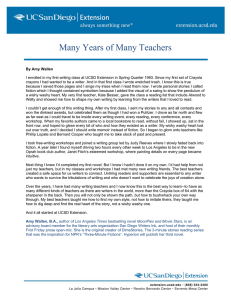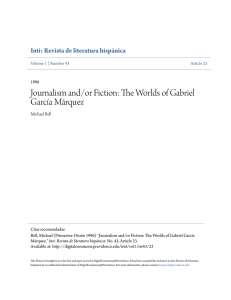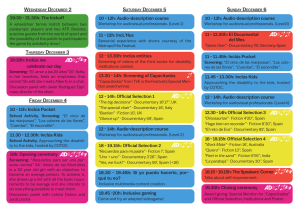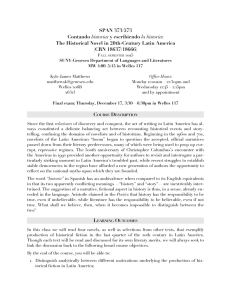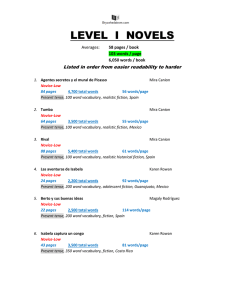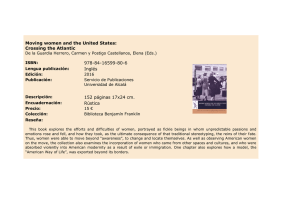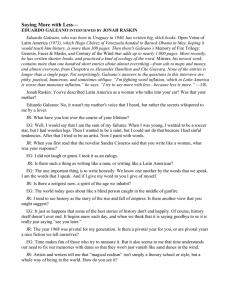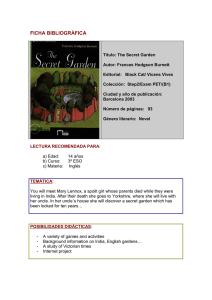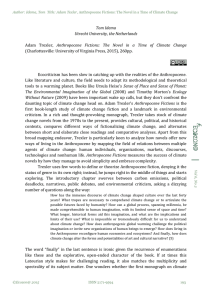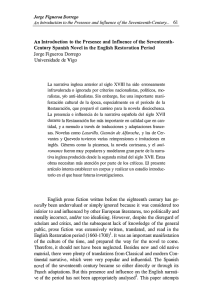researching science fiction basic guidelines
Anuncio
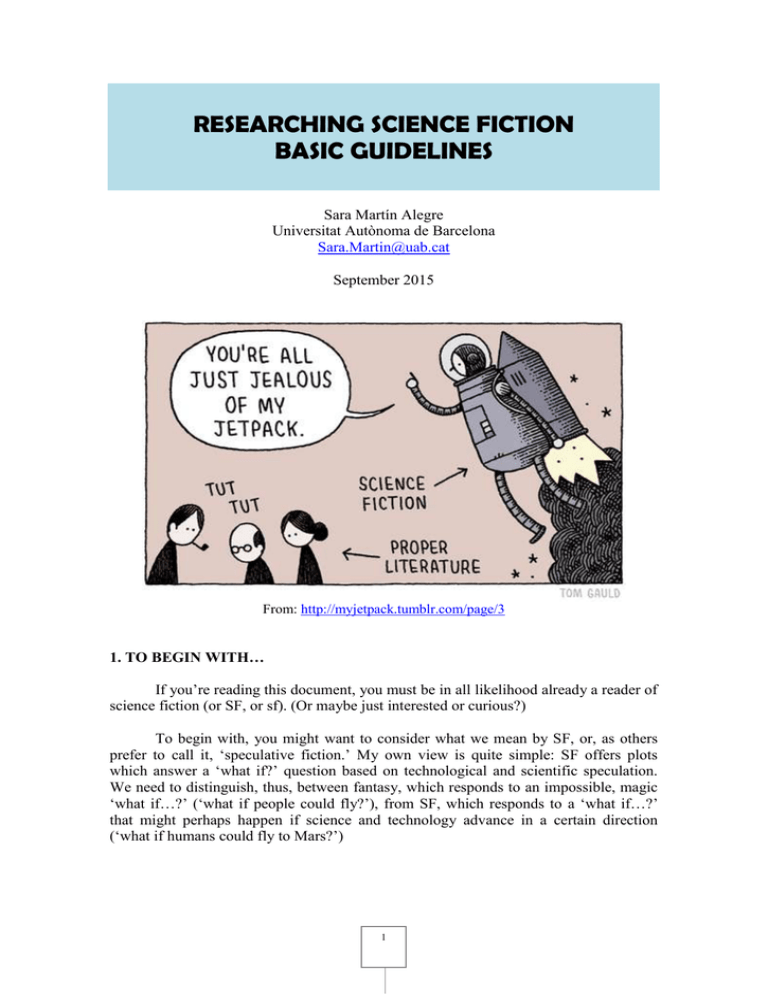
RESEARCHING SCIENCE FICTION BASIC GUIDELINES Sara Martín Alegre Universitat Autònoma de Barcelona Sara.Martin@uab.cat September 2015 From: http://myjetpack.tumblr.com/page/3 1. TO BEGIN WITH… If you’re reading this document, you must be in all likelihood already a reader of science fiction (or SF, or sf). (Or maybe just interested or curious?) To begin with, you might want to consider what we mean by SF, or, as others prefer to call it, ‘speculative fiction.’ My own view is quite simple: SF offers plots which answer a ‘what if?’ question based on technological and scientific speculation. We need to distinguish, thus, between fantasy, which responds to an impossible, magic ‘what if…?’ (‘what if people could fly?’), from SF, which responds to a ‘what if…?’ that might perhaps happen if science and technology advance in a certain direction (‘what if humans could fly to Mars?’) 1 Before embarking on academic work in this field you need to consider the following: *the list of authors/works you have read so far (and in which language): make it! (who’s your favourite, by the way, and why?) *your connections with fandom, if any *why you enjoy this particular genre (try giving yourself 3 reasons) *which media interests you more or most (print, including comics; screen: TV, film, videogames…) *which sub-genre you like best (from: https://www.worldswithoutend.com/resources_sub-genres.asp. Please, note that this is, rather, a list of themes often combined). Also check the list at http://bestsciencefictionbooks.com/ Science Fiction Sub-Genres Alien Invasion Alternate History (SF) Alternate/Parallel Universe Apocalyptic/PostApocalyptic Artificial Intelligence Colonization Cyberpunk Dying Earth Dystopia First Contact Galactic Empire Generation Ship Hard SF Human Development Immortality Light/Humorous SF Military SF Mind Uploading Mundane SF Mutants Mythic Fiction (SF) Nanotechnology Near-Future Pulp Robots/Androids Science-Fantasy Singularity Slipstream Soft SF Space Exploration Space Opera Steampunk Terraforming Theological Time Travel Uplift Utopia Virtual Reality Like other so-called popular genres with a still low academic projection, SF has fans who are experts in the field to an extent that very few academics can command. A fan usually has a massive knowledge of names and works based on reading them but needn’t consider aspects such as genre theory or genre history. A scholar, in contrast, must combine reading as much SF as possible with being up-to-date as regards the academic publications in the field. 2. BASIC RESOURCES There are MANY online resources run by fans which an SF scholar MUST learn to use. Check, for starters, the following: The Internet Speculative Fiction Database ISFD, http://www.isfdb.org/cgi-bin/index.cgi Worlds without End, https://www.worldswithoutend.com/ The SF Site, http://www.sfsite.com/ Locus Online, http://www.locusmag.com/ (resources section) 2 The title of the ISFD is self-descriptive. Worlds without End offers among many other items a short list of 62 top authors and another extensive database, with more than 1,000 names. The SF Site has hundreds of reviews and runs a useful newsletter you could subscribe to. The website of the magazine Locus has a truly impressive resource section. All this can be very nicely complemented with the corresponding Wikipedia entry. Wikipedia actually has a Science Fiction Authors list, at http://en.wikipedia.org/wiki/List_of_science_fiction_authors. NOTE: in the four cases, SF is mixed with fantasy and horror. It’s up to you to delimit the list of SF authors/works you’re interested in, always bearing in mind that no genre is ever ‘pure’. To begin finding works that might interest you another useful strategy is checking a book you enjoy at Amazon (US, UK) and see what other books customers have bought; or check an author’s page for the same reason. Amazon carries, as you know, readers’ opinions. Another excellent site in that sense is Goodreads (www.goodreads.com) For SF in Spanish and in Spain, check the extensive database Tercera Fundación at http://www.tercerafundacion.net/ 3. AWARDS The SF ‘canon’, as you can see in Worlds without End, very clearly results from the overlapping of the main awards (adapted from the awards’ websites and Locus online): Hugo - http://www.thehugoawards.org/ (given by fans since 1955, voted at the Worldcon, or World Science Fiction Convention) Nebula - http://www.sfwa.org/nebula-weekend/nebula-awards/ (The Nebula Awards ® are voted on, and presented by, active members of Science Fiction and Fantasy Writers of America, Inc. since 1965) British Science Fiction Association - http://www.bsfa.co.uk/ (The BSFA awards are presented annually by the British Science Fiction Association, founded 1958, based on a vote of BSFA members and–in recent years–members of the British national science fiction convention Eastercon.) Locus Science Fiction - http://www.locusmag.com/ (The Locus Awards are presented to winners of Locus Magazine's annual readers' poll since 1971) John W. Campbell Memorial - http://www2.ku.edu/~sfcenter/campbell.htm (Not to be confused with the John W. Campbell Award for Best New Writer. It is awarded each year to the best SF novel published in the US. It is the first major SF award established after the Hugos and Nebulas, and is distinguished from them by being a judged award, limited to novel). Theodore Sturgeon Memorial Award http://www2.ku.edu/~sfcenter/sturgeon.htm (The short fiction counterpart of the John W. Campbell Memorial Award. Since 1987) Philip K. Dick - http://www.philipkdickaward.org/ (Since 1982, given to the best original paperback published each year in the US. Five judges read submissions from publishers and determine the shortlist, then the winner. Judges choose their own successors, and only writers or academics are eligible to be judges.) 3 Arthur C. Clarke - http://www.clarkeaward.com/ (Given to the best SF novel published each year in the UK, not necessarily by a British writer, by a panel of judges overseen by the Science Fiction Foundation. Originally sponsored by Clarke himself.) There are others like the James Tiptree, Jr. Award, an annual literary prize for “science fiction or fantasy that explores and expands the roles of women and men for work by both women and men”. It's named after Alice B. Sheldon, who wrote under the pseudonym James Tiptree, Jr. for many years before revealing her identity and real name. Since 1992, awarded at Wiscon (the feminist SF convention). Five judges are selected each year, who evaluate recommendations submitted by publishers and by readers. Judges choose a winner, and release a 'shortlist' and sometimes a 'longlist' of other works they feel merit attention, though those lists are not considered to be finalists or runners-up. Website: http://www.tiptree.org/ The website of Locus Magazine, has an extensive list of awards you might want to check: http://www.locusmag.com/SFAwards/index.html The main awards in Spain are: Premio Ignotus (1991, given by Pórtico and the Asociación Española de Fantasía, Ciencia Ficción y Terror). It’s for work published in Spain, also in translation. http://www.aefcft.com/ Premio Minotauro (since 2004, awarded by the publishing house Minotauro [part of Planeta] to an unpublished sf, horror or fantasy novel originally in Spanish), http://www.planetadelibros.com/premios-premio-minotauro-6.html Premio UPC (http://minitecnica.upc.es/cficcio/home/home.asp), for unpublished works in Spanish, Catalan, English or French. Since 1991. 4. CONVENTIONS SF fans meet annually in conventions (‘cons’), the largest of which is the Worldcon (www.worldcon.org) run by the World Science Fiction Society. Eurocon is run by the European Science Fiction Society (http://www.esfs.info/) and in Spain, Hispacon is run by the Asociación Española de Fantasía, Ciencia Ficción y Terror (http://www.aefcft.com/index.html). The Societat Catalana de Ciència-ficció i Fantasia (1997 onwards, http://www.sccff.cat/), runs, rather, academic meetings. You may check the agenda for world-wide http://www.locusmag.com/Resources/Conventions.html conventions here: A convention is NOT an academic meeting (though it may include an academic programme) and it is not particularly valuable for your CV. However, you can always find it useful to join the ranks of the fans or to combine your fandom activities, if you already have them, with your academic work. To be honest, this is not very easy, as SF fans and professionals–writers, publishers, webmasters, etc–tend to be wary of academics, often suspecting us of being snobbish intruders, which might have a point!! My own view is that fans and SF professionals deserve all my respect and I do my best to address my work both to them (us?) and to scholarly specialists. 4 Remember that as a fan you may be as passionate as you wish, but as an academic you need to moderate that passion into sober scholarly work which, of course, can also be very personal and enthusiastic as long as you obey the rules of research and of academic rhetoric. 5. MAGAZINES Magazines are essential to understand how SF works as a genre, for this is where most writers begin (and continue...), by publishing short stories and novellas that have often later become classics (perhaps extended into novels). Don’t forget that most awards carry specific categories for shorter fiction and that novels are by no means the only literary expression of SF. You may check the list of main SF magazines (in English) here: https://www.worldswithoutend.com/resources_magazines.asp. The key ones are (from WWE): Analog - Science Fiction and Fact Analog is often considered the magazine where science fiction grew up. Analog has been home to many of science fiction's foremost writers and stories. Isaac Asimov, Robert A. Heinlein, Poul Anderson, Spider Robinson, Lois McMaster Bujold, and Michael F. Flynn are just a few of the prominent names which have often appeared. Asimov's - Science Fiction Asimov's Science Fiction features novellas, novelettes, short stories, poems, and fact-based articles by the genre's leading authors. Larry Niven, Robert Silverberg, Geoffrey Landis, Eleanor Arnason, James Patrick Kelly, and Kage Baker, are some of the magazine's stellar contributors. The Bulletin of the Science Fiction and Fantasy Writers of America The Bulletin is a quarterly magazine produced by the Science Fiction and Fantasy Writers of America (SFWA). Fantasy & Science Fiction The Magazine of Fantasy & Science Fiction, founded in 1949, is the awardwinning SF magazine which is the original publisher of SF classics like Stephen King's Dark Tower, Daniel Keyes's Flowers for Algernon, and Walter M. Miller's A Canticle for Leibowitz. Foundation: The International Review Of Science Fiction Foundation is the essential critical review of science fiction, and is published three times a year by the Science Fiction Foundation. It is peer-reviewed. Internet Review of Science Fiction The Internet Review of Science Fiction started in 2004 with the goal of creating a forum for the serious exploration of the literature of the fantastic. IRoSF publishes intelligent articles, essays, interviews, reviews, and criticism to illuminate the most interesting and important work in the genres of science fiction and fantasy. Interzone Founded in 1982, Interzone has maintained its position as one of the world's leading professional Science Fiction and Fantasy magazines, nominated for a Hugo many years running and winning in 1995. 5 Locus - The Magazine of the Science Fiction & Fantasy Field Locus Magazine, covering the science fiction and fantasy field since 1968, is a monthly magazine for news of the Science Fiction publishing field with extensive reviews and listings of new science fiction books and magazines. The New York Review of Science Fiction Semiprozine published monthly since 1988 featuring reviews and essays, and features of interest to the entire community of readers and writers of science fiction and associated genres. You may check much of the old pulp SF at the wonderful Pulp Magazines Project: http://pulpmags.org/default.htm It is hard to say which is the main SF Spanish magazine since BEM (1990-2000) and Gigamesh (1991-2006) stopped publication. Hélice (http://www.revistahelice.com/) covers very well the territory between fans and scholars. Suggestions to increase the list are welcome!! 6. SCHOLARLY CONFERENCES RESOURCES: JOURNALS, ASSOCIATIONS, 6.1 Journals The main journals (NOT magazines) where academic work on SF is published are (descriptions adapted from the journals’ webs): Extrapolation: A Journal of Science Fiction and Fantasy (1959-) http://extrapolation.liverpooluniversitypress.co.uk/. Extrapolation was the first journal to publish academic work on science fiction and fantasy and continues to be a leading, peer-reviewed, international journal in that specialized genre in the literature of popular culture. 3 issues per year (April, July and December). NOTE: Available online. Extrapolation is available to members of the Science Fiction Research Association: www.sfra.org Science Fiction Studies (1973-), http://www.depauw.edu/sfs/ is published three times a year (March, July, November) by SF-TH Inc. at DePauw University. NOTE: There’s a three-year blackout before reviews published in the journal appear on the website. Full texts of articles are posted three years after an issue has been sold out. Foundation (1981-), http://www.sf-foundation.org/publications/foundation/index.html: Foundation is the essential critical review of science fiction, and is published three times a year by the Science Fiction Foundation (http://www.sf-foundation.org/). NOTE: Its contents are not available online, only by subscription. The New York Review of Science Fiction (1988-), http://www.nyrsf.com/, is a monthly literary journal of science fiction that was established in 1988. It includes works of science fiction criticism, essays, and in-depth critical reviews of new works of fiction and scholarship. 6 Femspec (1999-), http://www.femspec.org/, is an interdisciplinary feminist journal dedicated to critical and creative works in the realms of SF, fantasy, magical realism, surrealism, etc. The journal is interested in a variety of feminisms and aims to be inclusive of ethnic and cultural diversity in an international perspective. Science Fiction Film and Television (2008-), http://www.liverpooluniversitypress.co.uk/index.php?option=com_content&view=articl e&id=55%3Ascience-fiction-film-and-television-&catid=8&Itemid=21, is a biannual, peer-reviewed journal published by Liverpool University Press. It invites submissions on all areas of sf film and television, from Hollywood productions to Korean or Turkish sf film, from Sci-Fi Channel productions to the origins of sf tv in Rod Brown of the Rocket Rangers or The Quatermass Experiment. 2 issues per year (April, Oct) *Will be 3 issues from 2013* NOTE: Available online. I believe that what the editors of Extrapolation announce can be made extensive to the other journals: [Extrapolation] invites papers on all areas of speculative culture, including print, film, television, comic books and video games, and particularly encourages papers which consider popular texts within their larger cultural context. The journal welcomes papers from a wide variety of critical approaches including but not limited to literary criticism, utopian studies, genre criticism, feminist theory, critical race studies, queer theory, and postcolonial theory. It is also interested in promoting dialogue among scholars working within a number of traditions and in encouraging the serious study of popular culture. We are particularly interested in the following areas of study: Racial constructions in speculative genres Children's and YA sf and fantasy Sexualities Fantastic motifs in mainstream texts Gender and speculative texts History of sf and fantasy New weird fiction Remakes, rewriting and retrofitting Pulp sf and fantasy The body in speculative texts Posthumanism Political sf and fantasy Non-Western speculative traditions Technoculture As I hope you can see, the list of topics is quite a good summary of the research topics now fashionable in SF. A most recent addition is the journal Alambique (http://scholarcommons.usf.edu/alambique/), whose first issue was published in August 2013. From their website: Alambique (ISSN 2167-6577) is a peer-reviewed, openaccess journal devoted to scholarly research and criticism in the fields of science fiction and fantasy originally composed in Spanish or Portuguese. Alambique accepts scholarly articles written in English, however, as long as the main focus of the study concentrates 7 on one of the Spanish or Portuguese cultural regions of the world. It also accepts scholarly articles written in Spanish, Portuguese and English that focus on relevant cultural contact areas, i.e. Catalan, Guarani, Nahuatl, etc. In addition, Alambique intends to publish old and/or largely forgotten literary works that helped forge the Spanish and Portuguese tradition in science fiction and fantasy. These texts, whenever possible, will have accompanying English translation. Many other journals publish scholarly work on SF though they might not be specialised, from the Journal of the Fantastic in the Arts to Atlantis (run by the Asociación Española de Estudios Anglo-Norteamericanos, AEDEAN), passing through any publication interested in the list of topics above. A main problem, in my view, is where to publish scholarly work in Spanish on foreign SF. Check ‘ciencia ficción’ as ‘título’ in the Dialnet database (http://dialnet.unirioja.es), and you’ll get a quite complete list of scholarly work in Spanish in this field. Among the miscellaneous journals that carry work on SF you’ll see: Quark: Ciencia, medicina, comunicación y cultura, CTS: Revista iberoamericana de ciencia, tecnología y sociedad, Arbor: Ciencia, pensamiento y cultura, Discurso: Revista internacional de semiótica y teoría literaria, Espéculo: Revista de Estudios Literarios, Secuencias: Revista de historia del cine, Tropelias: Revista de teoría de la literatura y literatura comparada, Insula: revista de letras y ciencias humanas… 6.2 Associations You might want to join the Science Fiction Research Association (http://www.sfra.org/). From their web: The Science Fiction Research Association (SFRA) is the oldest professional organization for the study of science fiction and fantasy literature and film. Founded in 1970, the SFRA was organized to improve classroom teaching; to encourage and assist scholarship; and to evaluate and publicize new books and magazines dealing with fantastic literature and film, teaching methods and materials, and allied media performances. Among the membership are people from many countries-students, teachers, professors, librarians, futurologists, readers, authors, booksellers, editors, publishers, archivists, and scholars in many disciplines. Academic affiliation is not a requirement for membership. The SFRA runs a yearly conference (usually in the USA) and publishes the SFRA Review, available online from their website. They also offer reduced subscription prices to the main journals. 6.3 Conferences Check the websites of the SFRA (USA) and the Science Fiction Foundation (UK) for upcoming scholarly events in the field. For conferences in general, check Conferences Alert, http://www.conferencealerts.com/. Remember that many conferences accept papers on SF, just make sure their topic fits your research interests (and the other way round). You might want to bear in mind the annual conference of the Utopian Studies Society for Europe (http://www.utopianstudieseurope.org/) 8 In Spain, the ‘I Congreso Internacional de Literatura Fantástica y Ciencia Ficción’ (Universidad Carlos III, 2008) has had no second edition, though the ‘I Congreso Internacional sobre lo fantástico en narrativa, teatro, cine, televisión, cómic y videojuegos’ (UAB, 2012) followed a similar line, in this case limited to Spanishspeaking cultures. Within English Studies Dr. Pere Gallardo organised the first ‘Science Fiction: Past, Present and Beyond’ encounter at Universitat Rovira i Virgili, Tarragona (March 2012), so far with no continuity. 7. WHAT TO READ 7.1 Primary Sources: SF Very often readers of SF feel lost (or overwhelmed) by the sheer richness of the field. It’s very hard to give advice, as this will depend on what you have already read and other factors, such as whether you want to complete your knowledge of the field in the past (= SF by dead authors) or in the present (= SF by living authors). In principle, SF is divided into several historical phases: 1. From the predecessors to pulp SF: from Mary Shelley’s Frankenstein (1818) to the establishment of Hugo Gernsback’s Amazing Stories (1926) –yes, the Hugo is named after him– and John W Campbell’s Astounding Science Fiction (1930) 2. The ‘Golden Age’ (1930s-1940s), with clear predominance of the magazines 3. The ‘Silver Age’ (1950s-mid 1960s), with a growing importance of the paperback SF novel 4. The ‘New Wave’ (mid 1960s-mid 1980s), in which the view of SF as a paraliterary popular genre is replaced by a view of SF as a respectable ‘literary’ genre, even worthy of academic study 5. Cyberpunk and post-cyberpunk (mid 1980s-present), in which the technological and scientific revolution brought on by computers establishes new parameters for SF. If you want to check what actual readers prefer, use the Goodreads list, http://www.goodreads.com/list/show/3.Best_Science_Fiction_Fantasy_Books Here are the 50 most voted books, for ‘Best Science Fiction & Fantasy Books’: 1 Ender's Game (first of Ender's Saga), by Orson Scott Card 2 Dune (Dune Chronicles, #1) by Frank Herbert 3 The Hitchhiker's Guide to the Galaxy (Hitchhiker's Guide, #1) by Douglas Adams 4 1984 by George Orwell 5 Fahrenheit 451 by Ray Bradbury 6 A Wrinkle in Time (Time, #1) by Madeleine L'Engle 7 Brave New World by Aldous Huxley 8 Foundation (Foundation, #1) by Isaac Asimov 9 Stranger in a Strange Land by Robert A. Heinlein 10 The Giver (The Giver, #1) by Lois Lowry 11 Slaughterhouse-Five by Kurt Vonnegut 12 The Hunger Games (The Hunger Games, #1) by Suzanne Collins 9 13 Do Androids Dream of Electric Sheep? by Philip K. Dick 14 Snow Crash by Neal Stephenson 15 Neuromancer by William Gibson 16 I, Robot by Isaac Asimov 17 Speaker for the Dead (Ender's Saga, #2) by Orson Scott Card 18 The Stand by Stephen King 19 The Martian Chronicles by Ray Bradbury 20 Jurassic Park by Michael Crichton 21 The Foundation Trilogy by Isaac Asimov 22 The Handmaid's Tale by Margaret Atwood 23 Starship Troopers by Robert A. Heinlein 24 Hyperion (Hyperion Cantos, #1) by Dan Simmons 25 The Time Machine by H.G. Wells 26 A Clockwork Orange by Anthony Burgess 27 Animal Farm by George Orwell 28 The Left Hand of Darkness by Ursula K. Le Guin 29 2001: A Space Odyssey by Arthur C. Clarke 30 The War of the Worlds by H.G. Wells 31 The Ultimate Hitchhiker's Guide to the Galaxy by Douglas Adams 32 The Road by Cormac McCarthy 33 Ender's Shadow (Shadow, #1) by Orson Scott Card 34 Cat’s Cradle by Kurt Vonnegut 35 Flowers for Algernon by Daniel Keyes 36 A Canticle for Leibowitz by Walter M. Miller Jr. 37 The Moon is a Harsh Mistress by Robert A. Heinlein 38 The Host (The Host, #1) by Stephenie Meyer 39 Childhood's End by Arthur C. Clarke 40 The Time Traveler's Wife by Audrey Niffenegger 41 Rendezvous With Rama (Rama, #1) by Arthur C. Clarke 42 Cryptonomicon by Neal Stephenson 43 Twenty Thousand Leagues Under the Sea by Jules Verne 44 Dragonflight (Pern, #1) by Anne McCaffrey 45 I Am Legend: And Other Stories by Richard Matheson 46 Ringworld by Larry Niven 47 The Diamond Age: Or, a Young Lady's Illustrated Primer by Neal Stephenson 48 Contact by Carl Sagan 49 The Forever War by Joe Haldeman 50 The Sparrow (The Sparrow, #1) by Mary Doria Russell This is quite a good list, but it shows that the voters are American (or mostly), as it excludes Britain’s top SF writers Iain M. Banks (Scottish) and China Miéville (English), among others. Also, it has ‘fashionable’ items such as the books by Suzanne Collins and Stephanie Meyer that seem out of place in a ‘serious’ SF-fantasy canon, and indeed some that are fantasy, not SF (Animal Farm). Additionally, I find that Dick’s novel Do Androids Dreams of Electric Sheep? is here because of having inspired Blade Runner, though Ubik and The Man in the High Castle are his real masterworks. For the British side, you might want to have a look at another list, published by The Guardian (2011): http://www.guardian.co.uk/books/table/2011/may/26/best-science-fiction-booksrecommendations For a more ‘canonical’ approach, why not use the list of the collection ‘SF masterworks’? Have a look: http://www.sfsite.com/lists/orion01.htm. And for the 10 always neglected women, the mistressworks can be found at http://iansales.com/2011/03/17/the-sf-mistressworks-meme/ and http://sfmistressworks.wordpress.com/. You could also have a look at WWE’s list of award winners by year at: https://www.worldswithoutend.com/books_index.asp And I’ll add for good measure the list I’m going through (or will be going through in the following years…), apart from anything Iain M. Banks and Neal Stephenson choose to publish (personal favourites!!) Bacigalupi, Paolo. The Windup Girl Bujold, Lois McMaster. Ethan of Athos and Paladin of Souls Cadigan, Pat. Synners Carter, Raphael. The Fortunate Fall Delany, Samuel R. Nova, Babel-17, and Stars in my Pockets like Grains of Sand Doctorow, Cory. Little Brother Egan, Greg. Teranesia Emshwiller, Carol. The Secret City Fowler, Karen Joy. Sarah Cannary. Gentle, Mary. Ash: A Secret History Goonan, Kathleen. In War Times Griffith, Nicola. Ammonite Haldeman, Joe. Camouflage Harrison, M. John. Light Hopkinson, Nalo. Brown Girl in the Ring Jones, Gwyneth. White Queen Kessel, John. Stories for Men LeGuin, Ursula. The Dispossessed McDonald, Ian. River of Gods McHugh, Maureen F. China Mountain Zhang McIntyre, Vonda N. Dreamsnake, The Moon and the Sun Merrick, Helen. The Secret Feminist Cabal: A Cultural History of Science Fiction Feminisms (essay) Miéville, China. The City and the City Mitchison, Naomi. Memoirs of a Spacewoman Moon, Elizabeth. The Speed of Dark Roberts, Adam. Salt Robson, Justina. Natural History Simmons, Dan. Illium Slonczewski, Joan. A Door into Ocean Stross, Charles. Glasshouse Swanwick, Michael. Stations of the Tide Tepper, Sheri. Grass Vinge, Joan D. Snow Queen (v 1, 1980) Vonarburg, Elisabeth. The Silent City Walton, Jo. Among others Please, understand that part of the task of doing research is finding your own path and this passes through choosing what you need/want to read. None can provide you with a closed list of recommendations, nor a ready-made canon you must read. 11 7.2 Secondary Sources: Scholarly work on SF For those of us in English Studies the obvious resource to use is the MLA database, specially for particular authors of texts. This is only accessible via subscription by your university library. Make sure you learn as soon as possible how to use it. For works published in Spanish, I find Dialnet (see above) very useful. The best resource covering scholarly books on SF is Science Fiction Studies’s “Bibliographies and Chronologies of Science Fiction” at http://www.depauw.edu/sfs/bibliochrons.htm. The “Chronological Bibliography of Science Fiction History, Theory, and Criticism” (http://www.depauw.edu/sfs/biblio.htm) is not 100% complete but it’s an excellent resource to understand the evolution of scholarly SF and what is fashionable for research at any given period, including right now. If you intend to study a particular topic begin by selecting from this very extensive list what might be useful for you. Here’s my selection of what any SF researcher should know about in chronological order. I’ve highlighted the most useful volumes as introductions: Brian Aldiss. Billion Year Spree. Garden City, NY: Doubleday, 1973. [Brian W. Aldiss with David Wingrove. Trillion Year Spree: The History of Science Fiction. London: Gollancz, 1986.] Robert Scholes and Eric S. Rabkin. Science Fiction: History/Science/Vision. New York: Oxford UP, 1977. Patrick Parrinder. Science Fiction: A Critical Guide. London: Longmans, 1979. Darko Suvin. Metamorphoses of Science Fiction: On the Poetics and History of a Literary Genre. New Haven: Yale UP, 1979. Patrick Parrinder. Science Fiction: Its Criticism and Teaching. London: Methuen, 1980. Charles Platt. Dream Makers: The Uncommon People Who Write Science Fiction. New York: Berkley, 1980. Vivian Sobchack. The Limits of Infinity: The American Science Fiction Film, 1950-1975. S. Brunswick, NJ: Barnes, 1980. Rpt. and expanded as Screening Space: The American Science Fiction Film. New York: Ungar, 1987. Marleen S. Barr, ed. Future Females: A Critical Anthology. Bowling Green, OH: Bowling Green State U Popular P, 1981. Mark Rose. Alien Encounters: Anatomy of Science Fiction. Cambridge, MA: Harvard UP, 1981. Charles Platt. Dream Makers, Vol. II: The Uncommon Men and Women Who Write Science Fiction. New York: Berkley, 1983. Phil Hardy, ed. Science Fiction. London: Aurum, 1984. 2nd ed., 1991. Rpt. as The Encyclopedia of Science Fiction Movies. Minneapolis: Woodbury, 1986. 2nd ed. rpt. as The Overlook Film Encyclopedia: Science Fiction, 1994. Donna J. Haraway. "A Cyborg Manifesto: Science, Technology, and Socialist-Feminism in the Late Twentieth Century." 1985. Rpt. in Simians, Cyborgs, and Women: The Reinvention of Nature. New York: Routledge, 1991: 149-181. Tom Moylan. Demand the Impossible: Science Fiction and the Utopian Imagination. New York: Methuen, 1986. Bruce Sterling. "Preface." In Mirrorshades: The Cyberpunk Anthology, ed. Bruce Sterling. New York: Arbor, 1986. vii-xiv. Marleen S. Barr, Alien to Femininity: Speculative Fiction and Feminist Theory. Westport, CT: Greenwood, 1987. Vivian Sobchack. Screening Space: The American Science Fiction Film. New York: Ungar, 1987. 12 James Gunn, ed. The New Encyclopedia of Science Fiction. New York: Viking, 1988. Sarah Lefanu. In the Chinks of the World Machine: Feminism and Science Fiction. London: The Women's Press, 1988. Annette Kuhn, ed. Alien Zone: Cultural Theory and Contemporary Science Fiction Cinema. New York: Verso, 1990. Lucie Armitt, ed. Where No Man Has Gone Before: Women and Science Fiction. London: Routledge, 1991. Jean Baudrillard. "Two Essays": "Simulacra and Science Fiction" and "Ballard's Crash." SFS 18.3 (November 1991): 309-320. Marleen S. Barr. Feminist Fabulation: Space/Postmodern Fiction. Iowa City: U of Iowa P, 1992. Henry Jenkins. Textual Poachers: Television Fans and Participatory Culture. New York: Routledge, 1992. Scott Bukatman. Terminal Identity: The Virtual Subject in Postmodern Science Fiction. Durham, NC: Duke UP, 1993. John Clute and Peter Nicholls, eds. The Encyclopedia of Science Fiction. New York: St. Martin's, 1993. Jenny Wolmark. Aliens and Others: Science Fiction, Feminism, and Postmodernism. Hemel Hempstead, Herts: Harvester, 1994. Damien Broderick. Reading by Starlight: Postmodern Science Fiction. New York: Routledge, 1995. Joanna Russ. To Write Like a Woman: Essays in Feminism and Science Fiction. Bloomington, IN: Indiana UP, 1995. Anne Balsamo. Technologies of the Gendered Body: Reading Cyborg Women. Durham, NC: Duke UP, 1996. Jane L. Donawerth. Frankenstein's Daughters: Women Writing Science Fiction. Syracuse, NY: Syracuse UP, 1997. Gary Westfahl. The Mechanics of Wonder: The Creation of the Idea of Science Fiction. Liverpool: Liverpool UP, 1998. N. Katherine Hayles. How We Became Posthuman: Virtual Bodies in Cybernetics, Literature, and Informatics. Chicago: U of Chicago P, 1999. Annette Kuhn, ed. Alien Zone II: The Spaces of Science Fiction Cinema. New York: Verso, 1999. David Seed. American Science Fiction and the Cold War: Literature and Film. Fitzroy Dearborn, 1999. Marleen S. Barr, ed. Future Females, The Next Generation: New Voices and Velocities in Feminist Science Fiction Criticism. New York: Rowman & Littlefield, 2000. Tom Moylan. Scraps of the Untainted Sky: Science Fiction, Utopia, Dystopia. Boulder, CO: Westview, 2000. Patrick Parrinder. Learning from Other Worlds: Estrangement, Cognition and the Politics of Science Fiction and Utopia. Liverpool: Liverpool UP, 2000. Adam Roberts. Science Fiction. New Critical Idiom series. London & New York: Routledge, 2000. M. Keith Booker, Monsters, Mushroom Clouds, and the Cold War: American Science Fiction and the Roots of Postmodernism, 1946-1964. Westport, CT: Greenwood Press, 2001. J. P Telotte. Science Fiction Film. Genres in American Cinema. Cambridge UP, 2001. Attebery, Brian. Decoding Gender in Science Fiction. New York: Routledge, 2002. Justine Larbalestier. The Battle of the Sexes in Science Fiction. Middletown, CT: Wesleyan UP, 2002 Ziauddin Sardar and Sean Cubitt, eds. Aliens R Us: The Other in Science Fiction Cinema. London: Pluto Press, 2002. Raffaella Baccolini and Tom Moylan, eds. Dark Horizons: Science Fiction and the Dystopian Imagination. New York: Routledge, 2003. Edward James and Farah Mendlesohn, eds. The Cambridge Companion to Science Fiction. Cambridge: Cambridge UP, 2003. 13 M. Keith Booker. Science Fiction Television. Praeger Television Collection. Westport, CT: Praeger, 2004. Sabine Heuser. Virtual Geographies: Cyberpunk at the Intersection of the Postmodern and Science Fiction. New York: Rodopi, 2003. Roger Luckhurst. Science Fiction. Cambridge, UK: Polity, 2005. David Seed, ed. A Companion to Science Fiction. Oxford: Blackwell, 2005. Adam Roberts. The History of Science Fiction. New York: Palgrave/Macmillan, 2006. Sharon DeGraw. The Subject of Race in American Science Fiction. New York: Routledge, 2007. Patricia Kerslake. Science Fiction and Empire. Liverpool Science Fiction Texts and Studies. Liverpool: Liverpool UP/U Chicago P, 2007. Sherryl Vint. Bodies of Tomorrow: Technology, Subjectivity, Science Fiction. Toronto: U of Toronto P, 2007. James Gunn, Marleen S. Barr, and Matthew Candelaria, eds. Reading Science Fiction. New York: Palgrave/Macmillan, 2008. Wendy Gay Pearson, Veronica Hollinger, and Joan Gordon, eds. Queer Universes: Sexualities in Science Fiction. Liverpool: Liverpool UP, 2008. John Rieder. Colonialism and the Emergence of Science Fiction. Middletown, CT: Wesleyan UP, 2008. J.P Telotte, ed. The Essential Science Fiction Television Reader. Lexington: UP of Kentucky, 2008. Lisa Yaszek, Galactic Suburbia: Recovering Women's Science Fiction. Columbus: Ohio State UP, 2008. Mark Bould, Andrew M. Butler, Adam Roberts, and Sherryl Vint, eds. The Routledge Companion to Science Fiction. New York: Routledge, 2009. Mark Bould, Andrew M. Butler, Adam Roberts, and Sherryl Vint, eds. Fifty Key Figures in Science Fiction. New York: Routledge, 2010. Mark Bould and Sherryl Vint. The Routledge Concise History of Science Fiction. New York: Routledge, 2011. Jessica Langer. Postcolonialism and Science Fiction. New York: Palgrave Macmillan, 2011. David Seed. Science Fiction: A Very Short Introduction. New York: Oxford UP, 2011. In Spanish please read: *Noemí Novell, Literatura y cine de ciencia ficción. Perspectivas teóricas (2008), PhD dissertation, http://www.tdx.cat/handle/10803/4892 *Quaderns de filologia. Estudis literaris Nº 14, 2009. Número monográfico: La ciencia ficción en los discursos culturales y medios de expresión contemporáneos. Eds. Adela Cortijo, Guillermo López, Antonio Altarriba. *Fernando Ángel Moreno, Teoría de la Literatura de Ciencia Ficción: Poética y Retórica de lo Prospectivo. Madrid: Portal, 2010. 7.3 Resource centres If you’re thinking of a research stay, consider: *The Science Fiction Hub of the Science Fiction Foundation, University of Liverpool, http://www.sfhub.ac.uk/ *The J. Wayne and Elsie M. Gunn Center for the Study of Science Fiction at the University of Kansas, http://www.sfcenter.ku.edu/ NOTE: This two websites are also wonderful resources by themselves. 14 *From Wikipedia, “Science Fiction Libraries and http://en.wikipedia.org/wiki/Science_fiction_libraries_and_museums Museums”, Research collections J. Lloyd Eaton Collection of Science Fiction, Fantasy, Horror, and Utopian Literature (University of California, Riverside) (Collection description)http://en.wikipedia.org/wiki/Science_fiction_libraries_and_muse ums - cite_note-1 The Science Fiction Foundation Collection, Special Collections and Archives, Sydney Jones Library, University of Liverpool M. Horvat Collection of Science Fiction Fanzines, University of Iowa Libraries, Special Collections Dept. The Judith Merril Collection of Science Fiction, Speculation and Fantasy, Toronto Public Library (founded 1970) Michigan State University Libraries, Science Fiction Collection; includes collection of Tiptree Award, Clarion archives, and Science Fiction Writers of America depository MIT Science Fiction Society ("the world's largest open-shelf collection of science fiction"); local index Caltech S.P.E.C.T.R.E. lending library of over 12,000 volumes of speculative fiction at the California Institute of Technology Paskow Science Fiction Collection, Temple University Libraries, including a significant collection of fanzines University of Maryland Baltimore County, ca. 10,000 book volumes and serials, and the Coslet Collection of 15,000 SF fanzines Maison d’Ailleurs ("House of Elsewhere"), Yverdon-les-Bains, Switzerland (founded 1976 and holding more than 40,000 books and other items) Science Fiction and Fantasy Writers of America Collection Northern Illinois University. Science Fiction Writers of America depository, pulps, and collects the papers of current SF authors. University of Delaware's Special Collections, including the "Roland Bounds Science Fiction Collection" (30,000 volumes) Georgia Tech's "Bud Foote Science Fiction Collection" (established 1999; 8,000+ volumes) Texas A&M University's "Science Fiction and Fantasy Research Collection" (More than 20,000 titles and "over ninety percent of the American science fiction pulp magazines published prior to 1980") San Diego State University's "Elizabeth Chater Collection of Science Fiction and Fantasy" Seoul Science Fiction & Fantasy Library Science Fiction Collections at the University of South Florida In Spain there’s not a centre like these ones, though you must be aware that: *the UAB Humanities library houses Xavier Úcar’s 700-volume SF collection (in translation). You may see the list entering in the library’s catalogue ‘Col·lecció de ciència-ficció de Xavier Úcar (Universitat Autònoma de Barcelona)’ under Author *the Universitat Rovira i Virgili of Tarragona has the largest collection of secondary sources on SF, purchased by SF/Utopian specialist Dr. Pere Gallardo. You can always use interlibrary loan to read particular books. 15 *the Universitat Politécnica de Catalunya also houses an extensive collection, purchased by Dr Miquel Barceló. See their resource centre at: http://minitecnica.upc.es/cficcio/premi_upc/castella/presentacio.asp Check the CBUC catalogue for the Catalan university libraries and Rebiun for all the Spanish university libraries. 8. WHAT ABOUT CINEMA, TV, ETC? This guide focuses on print, or literary, SF as usually students are more or less familiar with the best SF on film and TV. Comics and videogames are not a territory I’m familiar with and I’d welcome any addition to this guide that can help. For Comics, an Amazon.com user (from Denmark), offers a list that appears to be quite suggestive, of “The best science fiction comics and graphic novels” (http://www.amazon.com/science-fiction-comics-graphicnovels/lm/R1WVVBXECA4B7H). For computer games, you might consider the list of “Top 10 greatest science fiction games ever” at Scyfilove, though it’s from 2010 (see http://scyfilove.com/4011/the-top-10-science-fiction-computer-games-numbers-10-to6/, and http://scyfilove.com/4040/top-10-greatest-science-fiction-games-ever-five-tonumber-one/) and, from what I can guess, quite controversial. The basic tool to explore film and TV is, of course, the Internet Movie Data Base (www.imdb.com) which offers not only entries for each film and TV show but also lists compiled by users of their favourites. Here’s 50% the IMDB list of 50 best SF films (http://www.imdb.com/chart/scifi) 1. Star Wars, Episode V: The Empire Strikes Back (1980) 2. Inception (2010) 3. Star Wars, Episode IV: A New Hope (1977) 4. Matrix (1999) 5. Terminator 2: Judgement Day (1991) 6. Alien (1979) 7. Back to the Future (1985) 8. Aliens (1986) 9. WALL·E (2008) 10. Clockwork Orange (1971) 11. Eternal Sunshine of the Spotless Mind (2004) 12. Metropolis (1927) 13. Marvel: The avengers (2012) 14. Star Wars, Episode VI: The return of the Jedi (1983) 15. 2001: Space Odyssey (1968) 16. Blade Runner (1982) 17. The Thing (1982) 18. Donnie Darko (2001) 19. V for Vendetta (2005) 20. Terminator (1984) 21. Stalker (1979) 22. Twelve Monkeys (1995) 16 23. Kaze no tani no Naushika (1984) 24. War Games (1965) 25. District 9 (2009) IMDB doesn’t have a similar list for TV series. I’m borrowing 25 from ‘Top 100 Sci-Fi TV Shows’ (http://scifilists.sffjazz.com/lists_tv.html) –inexplicably V is only 37!: 1. 2. 3. 4. 5. 6. 7. 8. 9. 10. 11. 12. 13. 14. 15. 16. 17. 18. 19. 20. 21. 22. 23. 24. 25. Star Trek - The Next Generation (1987-1994) Battlestar Galactica (2003-10) Stargate SG-1 (1997-2007) The X-Files (1993-2002) Star Trek (1966-1969) Babylon 5 (1993-1999) The Twilight Zone (1959-1964) Farscape (1999-2003) Stargate – Atlantis (2004-2009) Star Trek - Deep Space Nine (1993-1999) Doctor Who (2005-) Firefly (2002) Star Trek – Voyager (1995-2001) The Outer Limits (1963-1966) Futurama (1999-2003) Doctor Who (1963-1989) Lost (2004-2010) Star Trek – Enterprise (2001-2005) The Avengers (with Emma Peel)( 1965-1967) Voyage to the Bottom of the Sea (1964-1968) Time Tunnel (1966-1967) Red Dwarf (1988-1999) The Invaders (1967-1968) The Adventures of Superman (1953-1957) My Favorite Martian (1963-1966) VERY IMPORTANT: If you are familiar with the films and TV and not with the books you’re not really an SF fan, but a ‘sci-fi’ fan. ‘Sci-fi’ is a more informal way of referring to SF but also a way to distinguish between committed SF fans, attracted by the ideas, and less committed ‘sci-fi’ fans attracted by the visuals. 9. MY OWN WORK If you wish to thank me in any way for this guide, please do so by reading (and even quoting!) any of my published works in the field of SF. THANK YOU!! Here’s the list from my Spanish CV: Libros TÍTULO: Expediente X: En Honor a la Verdad. LUGAR: Madrid EDITORIAL: Alberto Santos Editor (Imágica). FECHA DE PUBLICACIÓN: 2006. PP: 374 ISBN (13): 978-84-95070-87-6; ISBN (10): 84-95070-87-1 17 OTRAS INFORMACIONES: Segunda edición Expediente X: Serie completa (2010). ISBN 13: 978-84-15238-17-1 TÍTULO: Monstruos al Final del Milenio. LUGAR: Madrid EDITORIAL: Alberto Santos Editor (Imágica). FECHA DE PUBLICACIÓN: 2002. PP: 223 ISBN (13): 978-84-95070-33-3; ISBN (10): 84-95070-33-2 OTRAS INFORMACIONES: Segunda edición Monstruos en el cine (2010). ISBN 13: 97884-15238-13-3 Capítulos en Libros TÍTULO: “Shades of Evil: The Construction of White Patriarchal Villainy in the Star Wars Saga” AUTORES: Sara Martín Alegre. VOLUMEN: Josep M. Armengol (ed.). Men in Color: Racialised Masculinities in US Literature and Cinema. LUGAR: Newcastle EDITORIAL: Cambridge Scholars Publishing FECHA DE PUBLICACIÓN: 2011 PÁGINAS: 143-167. ISBN: 9781443826303 TÍTULO: “US Cult TV Series in the International Market: Considering the Reception of The X-Files in Spain” AUTORES: Sara Martín Alegre. , Morales M, & Arranz J. I. Prieto (eds.). A Comparison of Popular TV in English and Spanish Speaking Societies: Soaps, Sci-Fi, Sitcoms, Adult Cartoons, and Cult Series. LUGAR: Lewiston, N.Y EDITORIAL: Edwin Mellen Press. FECHA DE PUBLICACIÓN: 2010 PÁGINAS: 107-135. ISBN: 9780773435957 TÍTULO: “Science Fiction and the Paradox of Popularity: Tensions between the Screen and the Page” AUTORES: Sara Martín. VOLUMEN: María del Mar Azcona & Celestino Deleyto (eds.), Generic attractions: New essasys on film genre criticism LUGAR: París EDITORIAL: Michel Houdiard Éditeur FECHA DE PUBLICACIÓN: 2010 PÁGINAS: 260-270 ISBN: 978 23 56 920 331. TÍTULO: “Apocalypse Soon? The Uncertain Utopia of Steven Spielberg’s Adaptation of H.G. Wells’s The War od the Worlds.” AUTORES: Sara Martín Alegre. VOLUMEN: Elizabeth Russell (ed.), Trans/Forming Utopia: Vol I, Looking Forward to the End LUGAR: Berna. EDITORIAL: Peter Lang. FECHA DE PUBLICACIÓN: 2009. PÁGINAS: 165-174. ISBN: 978 3 03911 347 7. 18 TÍTULO: “La heroína virtual y la violencia fantasmal: La épica sensible de Aki Ross en Final Fantasy.” AUTORES: Sara Martín Alegre. VOLUMEN: Ana Antón Pacheco-Bravo et al (eds.), Sites of Female Terror: En torno a la mujer y al terror LUGAR: Cizur Menor (Navarra). EDITORIAL: Aranzadi. FECHA DE PUBLICACIÓN: 2008. PÁGINAS: 187-204. ISBN: 978 84 8355 876 8. Indexado en MLA TÍTULO: “De padre a hijo: La transmisión del discurso patriarcal en el cine de Hollywood (1977-2007)” AUTORES: Sara Martín VOLUMEN: Isabel Clúa (ed.), Género y cultura popular. Colección Discursos, 2. LUGAR: Bellaterra EDITORIAL: Universitat Autònoma de Barcelona. FECHA DE PUBLICACIÓN: 2008. PÁGINAS: 149-174. ISBN (13): 978 84 4902 5402. Libro completo disponible en http://cositextualitat.uab.cat/ NOTA: sobre las películas de la saga Star Wars y Frequency TÍTULO: “Our Own Alien Children: (Mis)representing the Child in John Wyndham’s The Midwich Cuckoos.” Julio Cañero, Fernando Galván & José Santiago Fernández (eds.), Culture & Power: Music, Media and Visual Arts. LUGAR: Alcalá de Henares. EDITORIAL: Universidad de Alcalá de Henares. FECHA DE PUBLICACIÓN: 2003. PÁGINAS: 178-188. ISBN (13): 978-84-8138-568-7; ISBN (10): 84-8138-568-9 TÍTULO: “Mulder, Scully and the Wild Thing: Sex and the Monster in The X-Files.” Antonio Ballesteros & Lucía Mora (eds.), Popular Texts in English: New Perspectives. LUGAR: Ciudad Real. EDITORIAL: Universidad de Castilla-La Mancha. FECHA DE PUBLICACIÓN: 2001. PÁGINAS: 371-380 ISBN (13): 978-84-8427-126-0; ISBN (10): 8484271269 TÍTULO: “Classic Shakespeare for All: Forbidden Planet and Prospero's Books, Two Screen Adaptations of The Tempest.” Deborah Cartmell, I.Q. Hunter, Heidi Kaye & Imelda Whelelan (eds.), Classics in Film and Fiction. LUGAR: Londres. EDITORIAL: Pluto Press. FECHA DE PUBLICACIÓN: 2000. PÁGINAS: 34-53 ISBN 0745315933 Indexado en MLA TÍTULO: “Cult Novels on the Screen: Dune and The Naked Lunch.” Fernando Toda, Juan A. Prieto Pablos, María José Mora & Teresa López Soto (eds.), Actas del XXI Congreso Internacional de AEDEAN. LUGAR: Sevilla. EDITORIAL: Universidad de Sevilla. FECHA DE PUBLICACIÓN: 1999. PÁGINAS 141-146. ISBN 8447204898 19 TÍTULO: “Monstrous Business: The Alien Film Series.” 141-152. Matilde Paredes, Rosa González, Felicity Hand, & Chantal Cornut-Gentille (eds.), Culture and Power: Business. LUGAR: Zaragoza. EDITORIAL: Departamento de Filología Inglesa, Universidad de Zaragoza. FECHA DE PUBLICACIÓN: 1999. PÁGINAS: 141-152. ISBN (13): 978-84-930940-1-0; ISBN (10) 8493094013 TÍTULO: “From the Screen to the Printed Page: Orson Scott Card's Novelization of James Cameron's The Abyss.” 509-514. Pere Guardia & John Stone (eds.), Proceedings of the 20th International AEDEAN Conference. LUGAR: Barcelona. EDITORIAL: Facultat de Filologia, Universitat de Barcelona. FECHA DE PUBLICACIÓN: 1997. PÁGINAS: 509-514. ISBN 84-370-5341-2 Indexado en MLA Artículos en Revistas Académicas TÍTULO: “Mujeres en la literatura de ciencia ficción: Entre la escritura y el feminismo” VOLUMEN: Dossiers Feministes 14, 2010 PÁGINAS: 108-128, http://www.raco.cat/index.php/DossiersFeministes/article/view/229293/311003 ISSN 1139-1219 TÍTULO: “Los límites morales de la autoridad militar: la Almirante Helena Cain en Galáctica, estrella de combate” VOLUMEN: Cuadernos Kóre, Vol 1, No 2 (Primavera 2010) PÁGINAS: 193-224, http://kusan.uc3m.es/CIAN/index.php/CK/article/viewFile/1045/486 ISSN 1889-9285 TÍTULO: “La debilitada posición de la ciencia ficción literaria: Tensiones entre la pantalla y la página” VOLUMEN: Quaderns de Filologia: Estudis Literaris, Vol 14, 2009. Número monográfico: La ciencia ficción en los discursos culturales y medios de expresión contemporáneos, Adela Cortijo, Guillermo López y Antonio Altarriba (eds.). PÁGINAS: 193-206 ISSN 1135-4178 TÍTULO: “Dana Scully: La heroína limitada.” REVISTA: Lectora: Revistes de Dones i Textualitat NÚMERO: 11, monográfico Género y cultura popular, editado por Isabel Clúa. FECHA DE PUBLICACIÓN: 2005 PÁGINAS: 115-130, http://ddd.uab.cat/pub/lectora/20309470n11/20309470n11p115.pdf ISSN 1136-5781 TÍTULO: “In Mary Shelley's Loving Arms: Brian Aldiss's Frankenstein's Unbound and its Film Adaptation by Roger Corman.” REVISTA: Foundation. The Science Fiction Foundation, University of Liverpool. NÚMERO: Volumen 32, Número 89 FECHA DE PUBLICACIÓN: Otoño 2003. PÁGINAS: 76-92. ISSN 0306-4964 Indexado en MLA TÍTULO: “Consider Banks: Iain (M.) Banks's The Wasp Factory and Consider Phlebas.” REVISTA: Revista Canaria de Estudios Ingleses, Número monográfico: Tomás Monterrey (ed.), Scottish Literature 1970-1999. Universidad de La Laguna. NÚMERO: Número 41. 20 FECHA DE PUBLICACIÓN: Noviembre 2000. PÁGINAS: 197-205. ISSN 0211-5913. Indexado en MLA Tesis Doctoral TÍTULO: 'More Human than Human': Aspects of Monstrosity in the Novels and Films of the 1980s and Early 1990s. (Tesis doctoral, edición microfilmada) LUGAR: Bellaterra. FECHA DE PUBLICACIÓN: 1996. EDITORIAL: Servei de Publicacions, Universitat Autònoma de Barcelona. ISBN: 84-490-0722-4 INTERNET: http://www.tesisenxarxa.net/TDX-0615109-182044/ Publicaciones en Sitio Web TÍTULO: “Mujeres y ciencia ficción” AUTORA: Sara Martín Alegre PÁGINA WEB: Observatori de les dones URL: http://www.observatoridelesdones.org/cat/M030503.html FECHA: Diciembre 2008 Trabajos en otras Publicaciones Periódicas Artículos TÍTULO: “En los amorosos brazos de Mary Shelley: Frankenstein desencadenado de Brian Aldiss” AUTORES: Sara Martín Alegre. REVISTA: Hélice, revista de la Asociación Cultural Xatafi. LUGAR: Madrid. FECHA DE PUBLICACIÓN: 2009. PÁGINAS: 100-115, http://www.revistahelice.com/revista/Helice_12.pdf ISSN: 1887-2905 10. FINALLY... Wikipedia carries a similar guide for ‘Science Fiction Studies’, of which I was unaware when I started my own. Compare both if you wish at: http://en.wikipedia.org/wiki/Science_fiction_studies I’ll be happy to help you in any way you want in your research on SF. Do not hesitate to contact me. Feedback and help are VERY welcome!! 21
